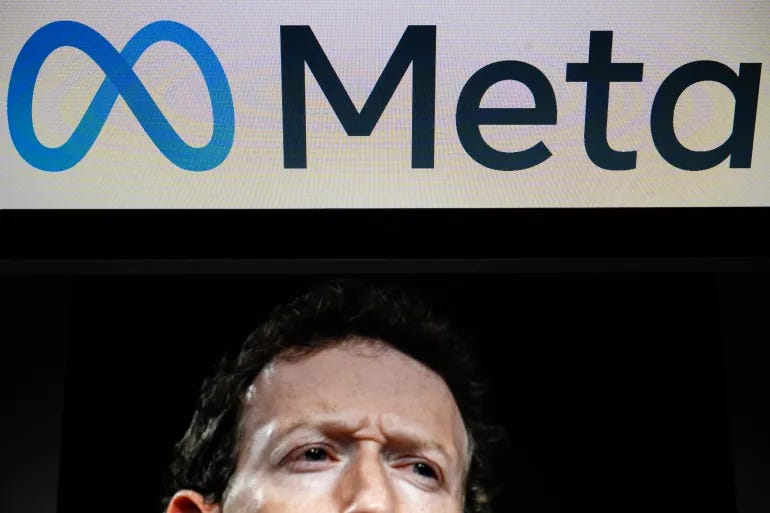Meta to End Fact-Checking on Facebook: What This Means for Social Media
Meta Shifts to Community Notes, Ending Third-Party Fact-Checking
Meta, the parent company of Facebook, Instagram, and Threads, has announced a significant shift in its content moderation strategy. CEO Mark Zuckerberg revealed in a video titled "More Speech and Fewer Mistakes" that Meta will discontinue the use of third-party fact-checkers and instead implement a system of community notes, similar to the approach used on X (formerly Twitter).
The decision, unveiled on Tuesday, comes amid growing scrutiny of tech companies' moderation policies, particularly as former U.S. President Donald Trump prepares for a potential return to the White House. Critics argue that removing fact-checking could lead to an increase in misinformation on Meta’s platforms.
Why Is Meta Making This Change?
In a social media post, Zuckerberg defended the move, stating that fact-checking organizations have often displayed bias in their selection of content to moderate. He emphasized that Meta’s new approach aims to promote free speech and reduce censorship.
“It’s time to return to our roots of free expression,” he said, adding that previous fact-checking efforts resulted in “intrusive labels and reduced distribution,” which, in his view, turned a system meant to inform users into a tool for censorship.
Meta’s new policy will apply to all content but will particularly impact discussions around topics like gender and immigration, areas that Zuckerberg specifically mentioned. The shift will be implemented across Meta’s platforms, which collectively serve over 3 billion users worldwide.
Meta’s Move to Texas: A Political Shift?
As part of this transition, Meta plans to relocate its content moderation teams from California to Texas. Zuckerberg claims this move will help build public trust and mitigate concerns about political bias in content moderation.
However, some experts suggest the decision is politically motivated. Samuel Woolley, a researcher at the University of Texas at Austin, noted that Texas is perceived differently from California, particularly by conservative politicians and voters. This perception could influence Meta’s regulatory landscape and its relationship with U.S. lawmakers.
Zuckerberg's move mirrors Elon Musk’s decision to relocate Tesla’s headquarters to Austin in 2021. Musk has also expressed interest in shifting X and SpaceX operations from California to Texas, citing concerns over California’s regulatory policies.
How Did Fact-Checking on Meta Work Before?
Since 2016, Meta has partnered with over 90 third-party fact-checking organizations across 60+ languages to assess the accuracy of content on its platforms. These organizations, including PolitiFact, FactCheck.org, and AFP Fact Check, could flag misleading content, which would then be labeled or have its distribution reduced. However, they did not have the power to delete content or suspend accounts; those decisions remained with Meta based on its community guidelines.
How Will Meta’s New Moderation System Work?
The transition to community notes mirrors X’s system, where users add contextual explanations to posts flagged as misleading. On X, these notes appear as annotations under posts and are crafted by contributors who meet specific eligibility criteria, including account age and verification status.
The effectiveness of this system is debated. Some studies suggest community notes reduce misinformation spread, while others highlight delays in flagging misleading content, particularly during viral news cycles.
Is Community Moderation Effective?
A 2024 University of Illinois study found that X’s Community Notes feature increased the likelihood of misinformation being retracted. Similarly, researchers from the University of Luxembourg reported a 61.4% reduction in misleading posts after community notes were applied. However, the study also noted that notes often appeared too late to curb the initial viral spread of misinformation.
A separate analysis by the Center for Countering Digital Hate found that only 7.4% of community notes related to election misinformation on X were actually displayed to users. This raises concerns about whether Meta’s new system will be any more effective than its predecessor.
Backlash from Fact-Checking Organizations and Experts
Meta’s decision has faced strong criticism from fact-checking organizations and digital media experts.
“Facts are not censorship. Fact-checkers never censored anything, and Meta always controlled the final decisions,” said Neil Brown, president of the Poynter Institute, which owns PolitiFact. AFP Fact Check called the move “a hard hit for the fact-checking community and journalism.”
Social media researchers have also warned that the change may lead to an increase in misinformation. Cornell University professor Claire Wardle suggested that bad actors could exploit the system to push misleading narratives.
Some analysts believe the decision is an attempt to placate conservative political figures ahead of the 2024 U.S. presidential election. Representative Alexandria Ocasio-Cortez accused Zuckerberg of following Musk’s lead in using “free speech” as a cover for favoring right-wing content.
Who Supports the Change?
Conversely, the shift has been praised by some figures on the right, including Elon Musk, who responded to the announcement with a simple, “This is cool.”
Conservative commentators have also welcomed the move, arguing that legacy media fact-checkers have had undue influence over online discourse. Republican Representative Randy Weber of Texas called the decision “a step toward letting Americans make decisions for themselves.”
Even former President Donald Trump seemed to take credit for the change, stating at a Mar-a-Lago press conference, “Probably,” when asked if his criticisms of Meta influenced the policy shift.
What Does This Mean for the Future of Social Media?
The change marks a pivotal moment for social media moderation. While proponents argue it enhances free speech and reduces corporate bias, critics warn that it could fuel misinformation and undermine trust in online platforms.
Initially, the rollout will occur in the U.S., but Zuckerberg has hinted at expanding it globally. He also criticized European and Latin American governments for enacting regulations he considers restrictive, positioning the U.S. as the last stronghold of free online speech.
The European Commission has refuted Meta’s claims of censorship, asserting that its digital policies focus on combating disinformation rather than restricting speech.
As Meta embarks on this new phase of content moderation, its success—or failure—could redefine the landscape of digital discourse for years to come.


